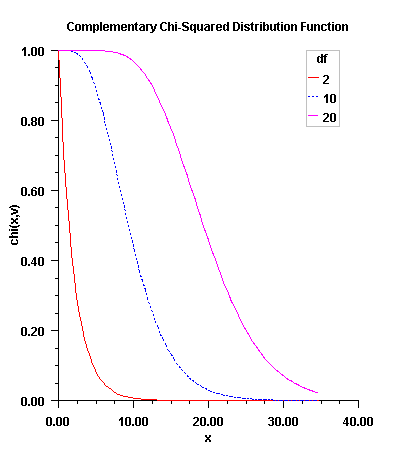Evaluates the complement of the chi-squared cumulative distribution function (CDF).
Synopsis
#include <imsls.h>
float imsls_f_complementary_chi_squared_cdf (float chi_squared, float df)
The type double function is imsls_d_complementary_chi_squared_cdf.
Required Arguments
float chi_squared (Input) Argument for which the complementary chi-squared distribution function is to be evaluated.
float df
(Input)
Number of degrees of freedom of the complementary chi-squared
distribution. df must be greater
than 0.
Return Value
The probability p that a chi-squared random variable takes a value greater than chi_squared.
Description
Function imsls_f_complementary_chi_squared_cdf
evaluates the complement of the CDF,  , of a chi-squared random variable
x = chi_squared
with ν = df
degrees of freedom, where,
, of a chi-squared random variable
x = chi_squared
with ν = df
degrees of freedom, where,

is the chi-squared CDF and Γ (⋅) is the gamma function. The value of the complementary chi-squared CDF at the point x is the probability that the random variable takes a value greater than x.
For ν > vmax = 1.e7, imsls_f_complementary_chi_squared_cdf uses the Wilson-Hilferty approximation (Abramowitz and Stegun [A&S] 1964, Equation 26.4.17) for p in terms of the normal CDF, which is evaluated using function imsls_f_normal_cdf.
For v ≤ vmax, imsls_f_complementary_chi_squared_cdf uses series expansions to evaluate p: for x < ν, imsls_f_complementary_chi_squared_cdf calculates p using A&S series 6.5.29, and for x > ν, imsls_f_complementary_chi_squared_cdf calculates p using the continued fraction expansion of the incomplete gamma function given in A&S equation 6.5.31.
Function imsls_f_complementary_chi_squared_cdf provides higher right tail accuracy for the complementary chi-squared distribution than does function 1 - imsls_f_chi_squared_cdf.

Figure 11-4 Plot of Fx (x, df)
Example
In this example, we find the probability that X, a chi-squared random variable, is less than 0.15 and the probability that X is greater than 3.0.
#include <imsls.h>
#include <stdio.h>
int main()
{
float chi_squared = 0.15, df = 2.0, p;
p = imsls_f_chi_squared_cdf(chi_squared, df);
printf("The probability that chi-squared\n");
printf(" with df = %1.0f is less than %4.2f is %6.4f\n",
df, chi_squared, p);
chi_squared = 3.0;
p = imsls_f_complementary_chi_squared_cdf(chi_squared, df);
printf("The probability that chi-squared\n");
printf(" with df = %1.0f is greater than %4.2f is %6.4f\n",
df, chi_squared, p);
}
Output
The probability that chi-squared
with df = 2 is less than 0.15 is 0.0723
The probability that chi-squared
with df = 2 is greater than 3.00 is 0.2231
Informational Errors
IMSLS_COMP_CHISQ_ZERO Since “chi_squared” = # is less than zero, the distribution function is one at “chi_squared”.
